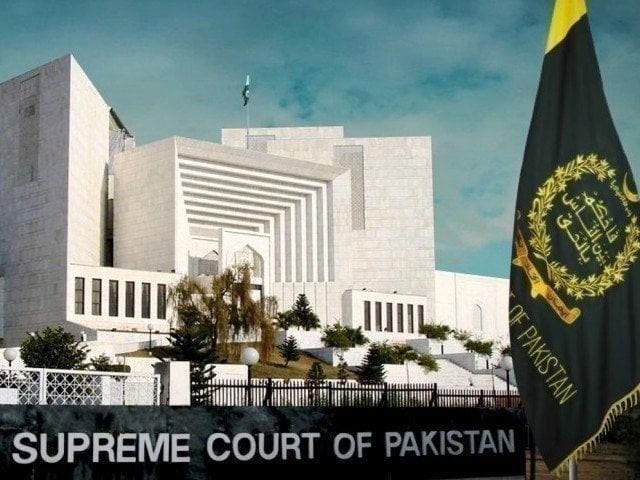Speaker's letter contradicts SC ruling
Speaker's letter contradicts SC ruling

The National Assembly speaker insists that the PTI is not entitled to reserved seats in view of recent amendments to the Election Act, 2017.
However, the Supreme Court has ruled that parliament can enact neither prospective nor retrospective laws to take away or abridge any of the fundamental rights guaranteed in the Constitution.
"Neither prospective nor retrospective laws can be enacted to take away or abridge any of the fundamental rights guaranteed by Articles 9 to 28 of the Constitution or in contravention of any other provision of the Constitution.
"The Constitutional prohibitions and requirements apply equally to both prospective and retrospective laws," said a 41-page judgement authored by Justice Syed Mansoor Ali Shah.
Justice Shah was leading a three-member bench which heard a case related to constitutionality of the amendments made to Section 65B of the Income Tax Ordinance, 2001 (ITO) by the Finance Act, 2019.
In a majority of 8 to 5, the Supreme Court on July 12 permitted the PTI to claim reserved seats in the NA as it allowed 41 lawmakerswho contested polls as independents and later joined the Sunni Ittehad Council (SIC)to join the PTI after submission of party affiliation certificates.
To counter this decision, the ruling coalition made amendments to the country election law, barring such change of party. The speaker on Thursday wrote a letter to the ECP, stating that he Supreme Court's decision could not be implemented following amendments to the Election Act, 2017.
However, the SC order noted that when a law regulating certain affairs is introduced for the first time, it is presumed to apply to future affairs, not to alter the character of past transactions made under the law as it then existed.
"This principle is encapsulated in the maxim lex prospicit non respicitthe law looks forward, not backward. A retrospective law is an exception to this general principle; therefore, courts approach the interpretation of laws with a presumption in favour of the general principle that laws are intended to regulate future affairs, not to affect past transactions.
"Exceptions of retrospective effect are interpreted strictly, as are other exceptions to general principles. This presumption is rooted in the rule of fairness, as altering accrued rights and obligations retrospectively is often considered unfair.
"Since the legislature is not expected to act in an unfair manner, it becomes essential to closely scrutinize a law that appears to have such an effect, ensuring that this was indeed the legislature's intent.
"Thus, the legislature is presumed not to have intended to alter the law applicable to accrued rights and obligations or past events and transactions unless a clear contrary intention is expressed.
"The strength of this presumption varies with the degree of potential unfairnessthe greater the unfairness, the more explicit the legislature's intent must be," said the judgement.
Some legal experts said amendments in the Election Act, 2017 gave retrospective affects to deprive the PTI from reserved seats. They wonder how a simple legislation affect the rights of any political party retrospectively.
A former law officer commenting on Speaker Ayaz Sadiq's letter said the July 12 judgment interpreting Article 51 cannot be undone by a simple legislation.
"Speaker exceeded his mandate," he added.
He also said the SC's majority judges issued clarification about the implementation of the July 12 order after enactment of recent law related to amendments in Election Act, 2017.
Former additional attorney general Tariq Mahmood Khokhar criticized the speak stating that "we have a purported speaker, who is not a non-partisan".
"He is a Form-47 usurper. He failed to protect the sanctity of parliament and its members. His ruling today exhorts a serial contemnor to defy the Supreme Court order on reserved seats is against the principle of the separation of powers, rule of law and parliamentary democracy.
"The parliamentary opposition members should sign a motion expressing no confidence in the chair," he said.
SC judgement
The court noted that Article 142 indicates that where the Constitution itself imposes a restriction on the exercise of legislative power in a particular manner or prescribes a specific manner for the exercise of legislative power, then the legislative power conferred by this Article cannot be exercised in the prohibited manner or can only be exercised in accordance with the manner specifically prescribed by the Constitution, as the case may be.
"Since Article 8 of the Constitution imposes a restriction on the legislative powers of Parliament and Provincial Assemblies with respect to making any law that takes away or abridges the rights conferred by Articles 9 to 28, neither Parliament nor Provincial Assemblies can exercise their legislative powers in a manner prohibited by this article.
"Article 12 bars the enactment of retrospective laws concerning criminal liabilities, except for acts of abrogation or subversion of the Constitution. Therefore, apart from the specified exception, Parliament and Provincial Assemblies cannot enact criminal laws with retrospective effect; however, there is no restriction on their legislative powers to enact civil laws with retrospective effect."
The court said that the Constitution only bars retrospective legislation concerning criminal liabilities, not civil rights and obligations.
"There is no such rule that even if a legislature has sought to take away a vested right, the courts must hold that such legislation is ineffective or strike down the legislation on the ground that it has retrospectively taken away a vested right," it said.
Meanwhile, the meeting of a three-member judges' committee, established under the Practice and Procedure Act, 2023 has been postponed. According to sources, the agenda of the judges' committee meeting included review petitions regarding the decision on Article 63(A). The agenda also included petitions related to the audio leak case. However, the meeting has been deferred.



















COMMENTS
Comments are moderated and generally will be posted if they are on-topic and not abusive.
For more information, please see our Comments FAQ